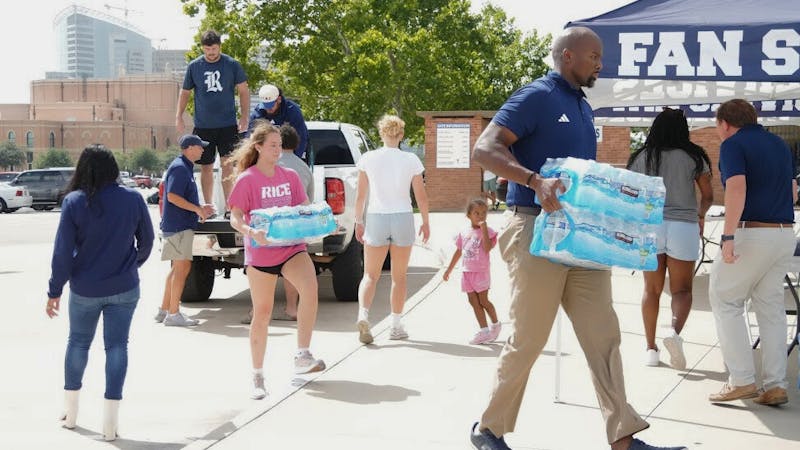Community gardens grow
Rather than going to a grocery store to get fresh produce, one Houston organization is giving people the opportunity to get food out of their own neighborhood gardens. This past Saturday, in Sunnyside, Houston Mayor Annise Parker helped to dedicate the Harry Holmes Healthy Harvest Garden, the first in a series of community gardens sponsored by the new I-Grow Houston initiative.
This initiative is the brainchild of Urban Harvest, a nonprofit in Houston that seeks to facilitate healthy communities and foster a respect for the environment through classes, community gardens and farmers markets, according to Urban Harvest Assistant Community Gardens Coordinator Erin Eriksen.
"Urban Harvest in 1994 was founded as a way to combat hunger through community gardens," Eriksen said.
The I-Grow Houston initiative is a more concentrated effort of the larger goal and helps to develop community gardens in low-income areas with the intention of providing the community access to fresh produce, Eriksen said.
The I-Grow Houston Initiative works with the Land Assemblage Redevelopment Authority to use city land for this project. LARA typically uses the plots of land it gains through vacancy or tax deliquency to develop affordable housing, but it is now leasing land to Urban Harvest in order to develop the community gardens, according to Eriksen.
Eriksen said Urban Harvest staff went around neighborhoods looking at land available through LARA to find their sites.
"Ideally, we would like lots with few trees, good sun and no pre-existing structures," Eriksen said.
Eriksen said that once Urban Harvest determined the ideal sites, it brought them before LARA, which voted in favor and worked with the initiative to develop lease contracts.
Initially, Urban Harvest will be very involved in the gardening process, helping to maintain the gardens.
However, Eriksen said the goal is to reduce the role of Urban Harvest.
"Our goal with each garden is that we will help it get started and, once it is established, let the gardeners run it themselves," Eriksen said.
These gardeners are individuals in the community who, after paying Urban Harvest a monthly fee of $5 to account for costs of water and other supplies, may grow whatever they would like to in their portions of the gardens. They can sell, consume or donate their crops - Urban Harvest has no restrictions in terms of what the gardeners do with their plants. Harry Holmes Healthy Harvest garden has 14 beds and is currently at capacity for rental space.
Urban Harvest, which had been promoting community gardens even before its new I-Grow Houston initiative, helped with the development of the three community gardens at Rice, according to Rice Environmental Club President Skye Kelty. The three gardens are located next to Martel College, Hanszen College and Wiess College. The gardens are maintained by Rice students, both voluntarily and as part of the class EBIO 204: "Environmental Sustainability: The Design and Practice of Community Agriculture," Kelty, a McMurtry College junior, said.
Kelty said she has taken the class and that she enjoyed it.
"[The course is] super low-key and fun and a great chance to learn about Houston as an ecosystem," Kelty said.
The vegetables grown in the gardens are used by the serveries as well as by the students in the class, who host harvest parties when the garden produces excess, according to Kelty. For more information about how to get involved with community gardens at Rice, visit www.ruf.rice. edu/~rsvpgard.
In addition to community gardens, Urban Harvest also advocates for farmers markets, working to bring fresh local produce to Houston. The organization helped to facilitate the farmers market Rice has on campus, according to Kelty. The Rice Farmers Market is host to local farmers selling a wide range of goods, from vegetables to flowers to cheese to soap.
Brown College sophomore Sam Tormey said he shops at the Rice Farmers Market and supports the idea of local food providers.
"The farmers market is a way to connect to local food providers, and it's nice because you know where the food is coming from," Tormey said. "It makes it very personal."
The Rice Farmers Market is open Tuesdays from 3:30-7 p.m. For more information, visit farmersmarket.rice.edu.
More from The Rice Thresher

Rice community, experts lend support to Kerrville after deadly floods
In the early hours of the morning on July 4, flood waters rapidly rose the Guadalupe River to 30 feet above its normal height. One of the few gauges on the river failed. Young girls sleeping in the cabins of Camp Mystic on the banks of the river had no phones to receive the flood warnings.

Tea Nook to close after 9 years of business
Rice’s student run boba tea shop will likely shutter its doors after managers were informed that they could no longer operate out of Sammy's Cafe in the Rice Student Center.

Summer indie staples serenade House of Blues on Peach Pit and Briston Maroney’s “Long Hair, Long Life” tour.
A crowd gathered at House of Blues Houston on June 18 to hear the upbeat bedroom pop that got many of them through high school. Titled the “Long Hair, Long Life” tour (see the band members), this collaboration between Peach Pit and Briston Maroney felt like a time capsule to 2017: a setlist teeming with both original songs and music from their latest albums, “Magpie” and “JIMMY”, and an unspoken dress code of cargo shorts, graphic T-Shirts and backward caps.

Please note All comments are eligible for publication by The Rice Thresher.